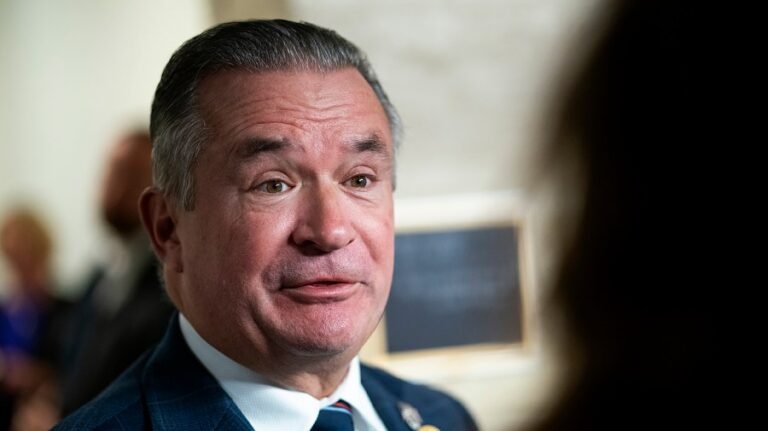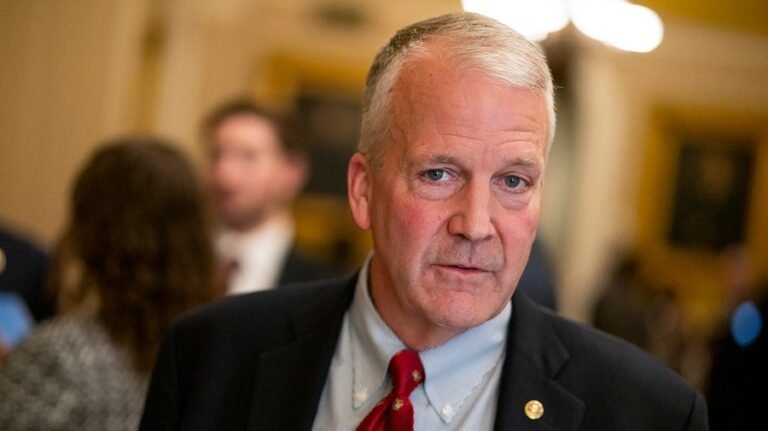
Republican senators came out firing during Defense Secretary Pete Hegseth’s hearing on Wednesday before the Senate Appropriations subcommittee on armed forces.
Sen. Mitch McConnell (R-Ky.) immediately pressed Hegseth over the Russia-Ukraine war, with Sen. Lindsey Graham (R-S.C.) driving home the point later in the hearing; Sen. Susan Collins (R-Maine), the top Senate appropriator, scolded the Pentagon’s delays with budget information; and Sen. Lisa Murkowski closed out the hearing by questioning the administration’s focus on Greenland in its Arctic strategy.
McConnell, one of three Republicans who opposed Hegseth’s confirmation, gaveled in the hearing by calling out the Trump administration for what he views as a flat base-line defense budget. He then launched into strong warnings against the U.S. cozying up to Russia in its bid to end its war in Ukraine.
McConnell said Washington’s allies are “wondering whether we’re in the middle of brokering what appears to be allowing the Russians to define victory. I think victory is defined by the people who have to live there — the Ukrainians.”
The former Senate majority leader who now chairs the subcommittee, McConnell asked Hegseth which side he wanted to win the war. The Defense chief said the Trump administration wanted the killing to end but would not choose a side.
“America’s reputation is on the line,” McConnell said. “Will we defend Democratic allies against authoritarian aggressors?”
Later in the hearing, Sen. Lindsey Graham (R-S.C.) asked Hegseth and Joint Chiefs of Staff Chair Gen. Dan “Razin” Caine Caine if Russian President Vladimir Putin is going to stop at Ukraine.
“I don’t believe he is,” Caine replied. Hegseth, meanwhile, said it “remains to be seen. Graham fired back, referring to his previous allusion to appeasement of Adolph Hitler: “Well, he says he’s not. This is the ‘30s all over. It doesn’t remain to be seen.”
The line of questioning laid bare the ideological divide within the GOP as to how the U.S. should confront Russia, seen by defense hawks as a global threat that must be countered with military assistance to prop up Ukraine and assert U.S. force in the European theater.
But many in the Trump administration, including Hegseth, have taken a more ambivalent tone, arguing for an America First approach that could see American troops rotated out of bases in Europe and an end to the flow of military aid from Washington to Kyiv.
“We don’t want a headline at the end of this conflict that says Russia wins and America loses,” McConnell told Hegseth.
The hearing had a far more adversarial tone compared to Hegseth’s appearance before the House Appropriations defense subcommittee a day prior, in which the Pentagon chief emerged largely unscathed, particularly at the hands of GOP members.
Democratic and Republican senators grilled Hegseth over a sparsely outlined defense budget for next fiscal year, echoing rare bipartisan criticism during the House hearing.
Collins reprimanded the Pentagon for being “unacceptably slow” in submitting a detailed Pentagon spending request for the fiscal year 2026. Congress is waiting on the information as the GOP struggles to agree on Trump’s reconciliation package.
She also told Hegseth that Trump’s budget request represented a reduction in buying power compared to the 2025 military budget, when inflation is taken into account, but suggested the Senate might correct that.
McConnell earlier was also critical of the administration’s defense spending plan, pushing back at Hegseth’s argument that the U.S. would be making the largest investment in the military in 20 years via Trump’s reconciliation package.
McConnell said putting funneling defense dollars into that package while declining to increase military spending in the regular budget “may well end up functioning as a shell game to avoid making the most significant annual investments that we spent years urging the Biden administration to make.”
There was also no shortage of criticism from the panel’s Democrats.
Sen. Dick Durbin (D-Ill.), bashed the Pentagon for cutting military medical research while spending $45 million for a grand military parade marking the Army’s 250th birthday, set for Saturday
“This is not consistent with what the men and women in uniform deserve,” Durbin said.
Others, including Sen. Patty Murray (D-Wash.) berated Hegseth for the Trump administration’s decision to send National Guard troops and active-duty Marines into Los Angeles this week, calling the actions a wildly out-of-proportion response to sometimes violent protests against Trump’s escalating immigration crackdowns.
“Threatening to use our own troops on our own citizens at such scale is unprecedented, it is unconstitutional, and it is downright un-American,” Murray said, noting that the actions were undermining the readiness of the U.S. military.
Sen. Jack Reed (D-R.I.) pressed Hegseth to reveal the cost or timeline of refurbishing Trump’s luxury jet from the Qatari government, meant to become Air Force One.
“You have signed a contract with a company to reconfigure the Qatari aircraft. What is the price of that contract?” Reed asked.
Hegseth replied that the information “cannot be revealed in this setting,” prompting Reed to fire back.
“Why can’t it be revealed? This is the appropriation committee of the United States Senate. We appropriate the money that you will spend,” Reed said.


